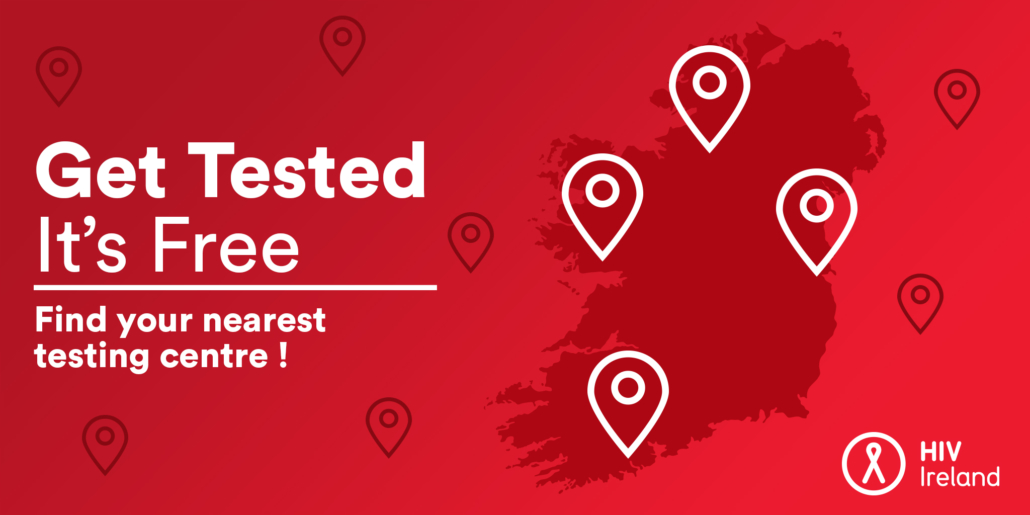The only way to know if you have HIV is to get tested. HIV testing is free in Ireland at public STI/GUM clinics and at some community-based testing venues including at HIV Ireland. These are confidential and non-judgmental services.
View the range of free testing options available at HIV Ireland.
Find your nearest HIV and STI testing clinic with our online Testing Locator Map.
Frequently Asked Questions
How do I know when to go for a test?
If you are sexually active, or injecting drugs, it is important to have regular health checkups, which includes testing for HIV, hepatitis and other STIs. You might not know if you have an infection as many STIs have no obvious symptoms, so you may not be aware that you or your partner(s) are infected.
If you think you have been exposed to HIV or other STIs then you should go for a full screening. This service is completely free of charge in public testing clinics.
Do I need a referral from my GP?
No
What do the tests involve?
An HIV test consists of a blood test. Most HIV tests are antibody tests that search for antibodies your body has produced if you have become exposed to HIV. It can take the body up to 12 weeks to produce these antibodies. This is known as the ‘window period’. If you present to a clinic for testing within the ‘window period’ you will be tested, and you may be asked to come back for re-testing.
Blood tests are also used to test for hepatitis B, hepatitis C and syphilis. An STI screen can involve a visual examination of the mouth and genital area. Swabs may be taken from the penis, vagina, anus and throat. A urine sample may also be required and it is recommended not to pass urine at least one hour before the tests.
What happens when I go to a clinic for HIV and STI tests?
A doctor (or nurse) will take your sexual history, and then you will have a series of tests. Each test usually takes only a couple of minutes to perform. Sometimes they can be slightly uncomfortable, but should not be painful. If you are having an HIV test, an advisor will talk you through it. Counselling may also be available.
When will I get the results?
This differs between clinics. If you have had a range of tests, you may receive some results while you are at the clinic. Results for blood tests, however, can take between 1 to 4 weeks. If you need treatment, this will be given to you at the clinic, and will be free of charge.
While you are waiting for a result, it is important to remember that you may have been exposed to HIV and therefore safer sex practices and safer injecting practices are recommended.
How are results given?
This differs between clinics. Some clinics will give you a follow-up appointment date to come back for your results; some give results by telephone; and some clinics offer a text service provided consent has been given by you. When you are at the clinic, ask how you will be informed of your results.
Is there anything I can do if I’ve had a very recent exposure to HIV?
There is a medical treatment course for people who have had a very recent sexual exposure or a needle-stick exposure to HIV, known as Post Exposure Prophylaxis (PEP). PEP works by trying to prevent the virus (HIV) from establishing itself in the bloodstream, and must be taken within 72 hours (3 days) after the possible exposure to HIV. PEP is effective, but is not a cure, for HIV. PEP is also available if a person has been exposed to hepatitis B infection.
What is a ‘Rapid’ HIV test?
A rapid HIV test involves a fingertip prick (or sometimes an oral swab), and a specimen is applied to the test kit. If there is a ‘reactive’ result, a blood sample is taken and sent to the laboratory for a confirmatory test. The result is usually available within about 20 minutes.
I don’t want to attend a public testing clinic. Can I get tested privately?
If you would like to avail of private HIV or STI testing (for a fee), you can go to your General Practitioner (GP), a family planning clinic or private healthcare clinic. Some HIV and STI hospital consultants also run private clinics. Costs and result times may vary.
Notifiable Infections
HIV became a notifiable infection in September 2011. This means that when a person is given a positive HIV diagnosis, a confidential form will now be completed by a healthcare worker, and the form is submitted to the Director of Public Health/Medical Officer of Health for that area. The information provided on the form does not identify the individual, as a coding system is used to allow for anonymity. The purpose of making HIV a notifiable infection is to ensure that there is accurate information on the number of cases of HIV in Ireland and the number of new cases each year. If you have any queries or concerns in relation to this, please feel free to contact our Community Support team.
Information for professionals about HIV notification is available here.

